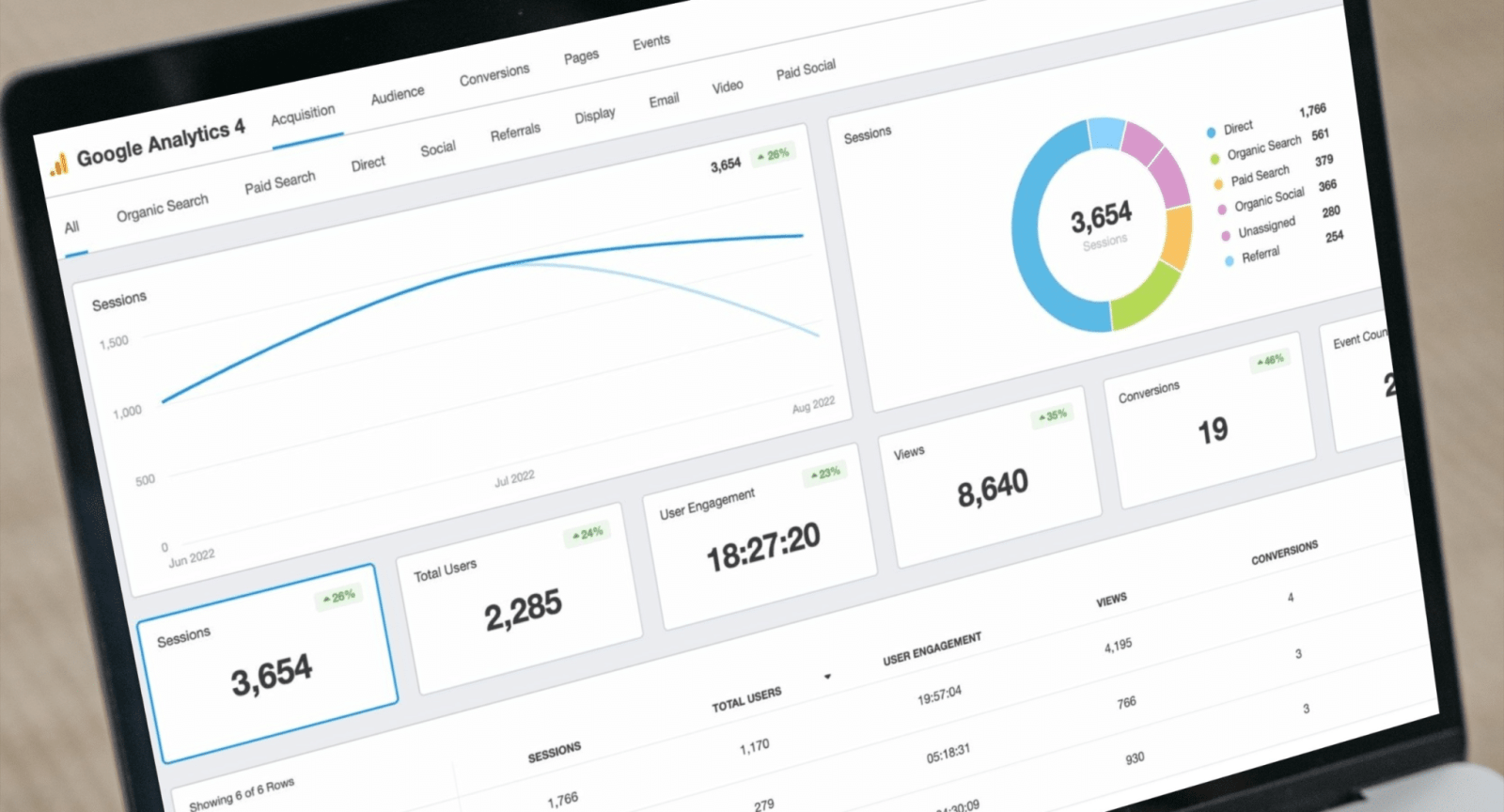Team Madcraft


In late 2020, Google introduced us to Google Analytics 4 (GA4), which is the largest update to Google Analytics they have made since 2012. It’s been nearly two years since the announcement, and the rollout has finally begun. With the planned retirement of Universal Analytics on July 2023, GA4 will become the only property choice on the platform. What does this mean for businesses going forward, though? What impact will GA4 have, and just what is it?
With everything from powerful machine learning algorithms tools to advanced metrics, this new version of Google Analytics will provide many opportunities for your business. While it may be some time away, it is essential to be prepared when the current version of Universal Analytics is no longer available.
GA4 is the next generation of Google Analytics, and it offers greater functionality and better analysis that will make your job easier. There are many good reasons to start shifting over to GA4. As we enter a cookieless future with no dependency on third-party cookie data, Google Analytics 4 will use different ways to identify your web visitors through collecting and processing first-party data.
If you’re ready to get started, our Google Advertising experts at Madcraft share their expertise on how your business can make a move to GA4.

The transition into Google Analytics 4 will impact many businesses. Without GA4, it will be difficult for any business to attract, grow and retain a valuable customer base. The following businesses will need GA4, most notably;
You may be asking yourself, why upgrade to GA4? What difference does it make? The answer is simple: it makes a huge difference. Here are the key differences.
GA4 uses an event-based model to measure hits on a website, in sharp contrast to Universal Analytics, which uses a session-based model to measure hits. Whereas Universal Analytics focused on hits like “page views”, “transitions”, “screen views”, etc GA4 will track all hits as events. Instead of focusing on how much traffic you receive, GA4 will emphasize how your audience engages with your site.
To show how users engage with your website, GA4 will offer enhanced insight where you can track detailed events from website visitors such as:
The GA4 model is more advanced than the current version of Google Analytics, but it is still in development, meaning it has the potential to be more progressive in the near future. GA4 uses machine learning algorithms that increase the speed and accuracy of data collection. This will offer huge potential to businesses as GA4 machine learning will be able to analyse the data for your site and forecast future data predictions. With GA4, machine learning analytics have evolved significantly. It can predict churn probability, likely churners, likely top spenders, likely purchases, purchase probability and more.
An additional perk of GA4 is the ability to track and combine data across your website and your mobile app, which can be stored in the same property, all in one place – which you can’t do in UA. With GA4, businesses can focus more on tracking the complete user journey instead of splitting it into session devices or platforms like UA.
Finally, as the internet becomes more privacy-centric with the increased scrutiny on privacy, GA4 will not collect or store users’ IP addresses. GA4 will allow for greater accessibility to data retention options where you can choose how long GA4 can hold user-specific data, from a minimum of 2 months to a maximum of 14 months, making it easier to compile with EU GDPR.
Only 16% of the top .ie websites have implemented the newer version of Google Analytics. This is a concerning figure indicating that many Irish businesses are not prepared to transition to the newer version of Google Analytics (GA4).
The GA4 model offers an improved user experience, new data collection methods, and increased functionality. At Madcraft, we encourage implementing the following to minimise the impact when GA4 replaces UA.
To start with, whether you’re already using Universal Analytics (UA) or not, we recommend installing Google Analytics 4 for your website as soon as possible. The great thing is that the GA4 property can co-exist alongside the same account as your UA so that you can start taking your time to familiarise yourself with the features and reports now while also collecting as much data as possible in the background.
By doing so, you will be able to start building a foundation for your website’s data on GA4 well in advance before GA4 replaces UA instead of rather than starting from scratch. We believe that starting now will help you collect enough data from over a year to make year-to-year comparisons on GA4.
Once you have installed GA4, you must set up the GA4 analytics property alongside the Universal Analytics Property. Once you have created a GA4 account and followed the setup – Google will automatically generate a GA4 Measurement ID for you, but you must manually port over any custom tracking code that will need to be on the newer version of web analytics Global Site Tag
GA4 has changed how analytical data will be gathered, processed, and presented on the interface. For starters, the GA4 interface has changed from a session-driven data model to an event-driven data model. With GA4, specific metrics have been adjusted, most notably the bounce rate, which is now replaced with an engagement rate.
According to Google, the reasoning for the change of the model is to give businesses a better understanding of how users interact with your website, as the UA session-based model focuses too much on how traffic comes to your site. Businesses with the GA4 tool will better understand the customer journey, including what is important to their visitors on the site and how much they engage with the content available to them.
Familiarising yourself with the new GA4 interface tool and understanding the difference between the metrics you regularly use in UA and what you will use in GA4 is significant for site owners. Learning to use the GA4 tool is the best way to measure your current performance against past performance on the different models.
We recommend all businesses have a plan in place for when Universal Analytics is no longer available. Identify the most significant data your business relies on and create the reports that coincide with those KPIs. This will give insight into historical data that will help you measure and compare performance on GA4. As of July 2023, Universal Analytics will stop processing new data, forcing everyone to move over to GA4 if they wish to keep using analytics to understand website users. After six months, all UA data will be eradicated, so we advise exporting your previously processed data reports as soon as possible.
To cause minimal disruption, the data from Universal Analytics should be exported and accessible for future analysis. Exporting this data can help you understand your performance and compare it to the new data collected on GA4.
You can export reports into the following formats:

Google Analytics 4 is the best tool to help you provide a more intuitive and efficient user experience.
We strongly recommend your business make the switch to Google Analytics 4 as soon as possible. Doing so will allow you to build a foundation of historical data as well as prepare your business for progression once Universal Analytics is replaced.
If you want support in setting up Google Analytics 4, our team at Madcraft can help you make a smooth transition to GA4.
If you want more information on Google Analytics 4 best features, click here.